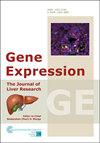Host Genetics and COVID-19: Genes Underlying the Patterns of Susceptibility and Prognosis
Q2 Biochemistry, Genetics and Molecular Biology
引用次数: 0
Abstract
Host-specific genetics, such as epigenetic profiles and genetic variants, can contribute to the pathogenesis of infectious diseases. Strong associations have been previously identified in infections by human immunodeficiency virus (HIV), Plasmodium falciparum, norovirus, and influenza A virus. Despite the efforts to characterize the role of host genetics in severe acute respiratory syndrome virus coronavirus 2 (SARS-CoV-2) infection, this comprehension remains incipient. Coronavirus disease 2019 (COVID-19) can evolve with a wide spectrum of manifestations, ranging from asymptomatic and mild cases to severe forms with acute respiratory distress syndrome, multi-organ complications, and even death. Classic clinical risk factors only partially explain this interindividual variability, suggesting that host genetics may contribute to the heterogeneity of courses. Robust evidence has revealed the multiple associations of genes (ABO, PPP1R15A, SLC6A20, IFNAR2, OAS, TYK2, CCR2, CCR5, TLR7, ApoE, TMPRSS2, HLA, ACE2, etc.) with the susceptibility and/or severity of SARS-CoV-2 infection. In addition, the genetics behind the established risk factors have been considered: at least four loci associated with COVID-19 severity (DPP9, FOXP4, SFTPD and MUC5B) have been previously linked to lung fibrosis, interstitial lung disease, lung carcinomas, and/or decreased lung function. In summary, identifying the host-specific genetic factors may improve our knowledge of risk groups for infection and severe outcomes, as well as the biological mechanisms of therapeutic relevance. Therefore, the present literature review aims to understand the genetics underlying the patterns of susceptibility and prognosis of COVID-19.宿主遗传学和COVID-19:易感性和预后模式的基因
宿主特有的遗传,如表观遗传谱和遗传变异,可以促进传染病的发病机制。在人类免疫缺陷病毒(HIV)、恶性疟原虫、诺如病毒和甲型流感病毒感染中已经发现了强烈的相关性。尽管已经努力表征宿主遗传学在严重急性呼吸综合征病毒冠状病毒2 (SARS-CoV-2)感染中的作用,但这种理解仍处于初级阶段。2019冠状病毒病(COVID-19)可演变为多种表现,从无症状和轻度病例到严重的急性呼吸窘迫综合征、多器官并发症,甚至死亡。经典的临床风险因素只能部分解释这种个体间变异性,表明宿主遗传可能导致病程的异质性。强有力的证据表明,基因(ABO、PPP1R15A、SLC6A20、IFNAR2、OAS、TYK2、CCR2、CCR5、TLR7、ApoE、TMPRSS2、HLA、ACE2等)与SARS-CoV-2感染的易感性和/或严重程度存在多重关联。此外,已确定的危险因素背后的遗传学已被考虑:至少四个与COVID-19严重程度相关的基因座(DPP9, FOXP4, SFTPD和MUC5B)先前已与肺纤维化,间质性肺疾病,肺癌和/或肺功能下降有关。总之,确定宿主特异性遗传因素可以提高我们对感染风险群体和严重后果的认识,以及与治疗相关的生物学机制。因此,本文献综述旨在了解COVID-19易感模式和预后的遗传学基础。
本文章由计算机程序翻译,如有差异,请以英文原文为准。
求助全文
约1分钟内获得全文
求助全文
来源期刊

Gene expression
生物-生物工程与应用微生物
CiteScore
3.80
自引率
0.00%
发文量
3
审稿时长
>12 weeks
期刊介绍:
Gene Expression, The Journal of Liver Research will publish articles in all aspects of hepatology. Hepatology, as a research discipline, has seen unprecedented growth especially in the cellular and molecular mechanisms of hepatic health and disease, which continues to have a major impact on understanding liver development, stem cells, carcinogenesis, tissue engineering, injury, repair, regeneration, immunology, metabolism, fibrosis, and transplantation. Continued research and improved understanding in these areas will have a meaningful impact on liver disease prevention, diagnosis, and treatment. The existing journal Gene Expression has expanded its focus to become Gene Expression, The Journal of Liver Research to meet this growing demand. In its revised and expanded scope, the journal will publish high-impact original articles, reviews, short but complete articles, and special articles (editorials, commentaries, opinions) on all aspects of hepatology, making it a unique and invaluable resource for readers interested in this field. The expanded team, led by an Editor-in-Chief who is uniquely qualified and a renowned expert, along with a dynamic and functional editorial board, is determined to make this a premier journal in the field of hepatology.
 求助内容:
求助内容: 应助结果提醒方式:
应助结果提醒方式:


